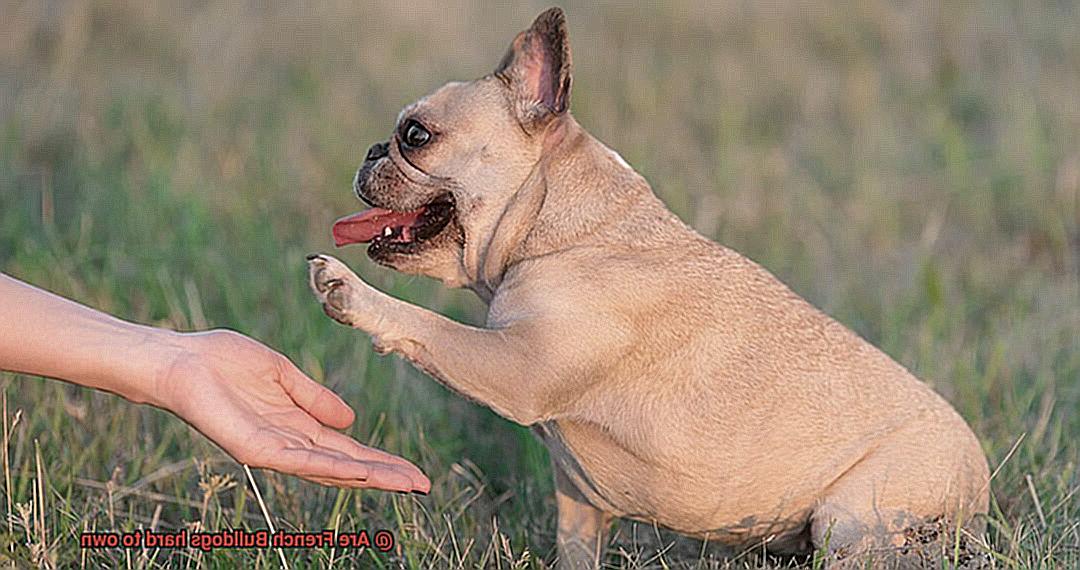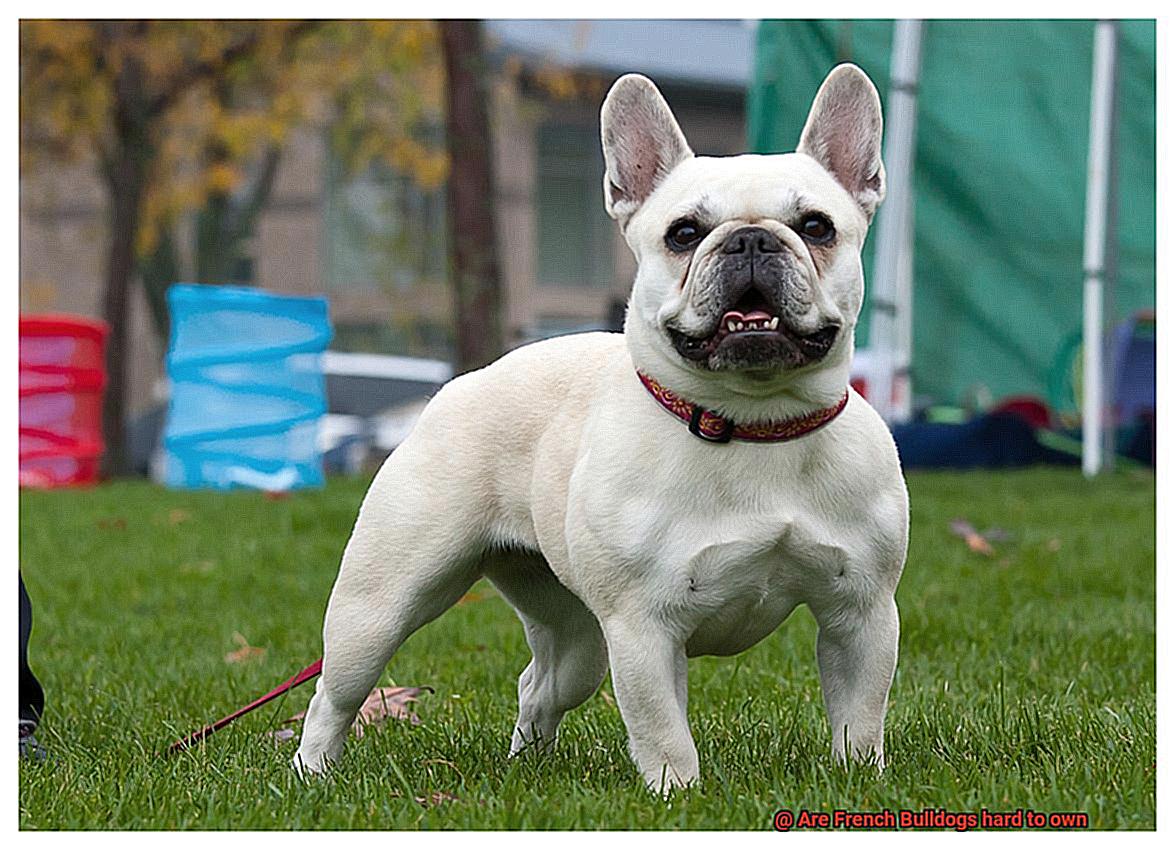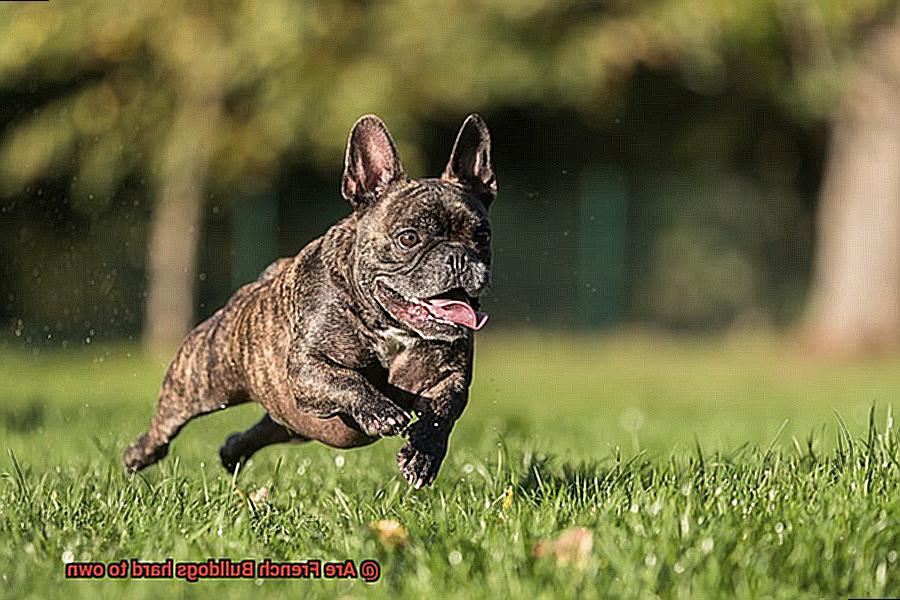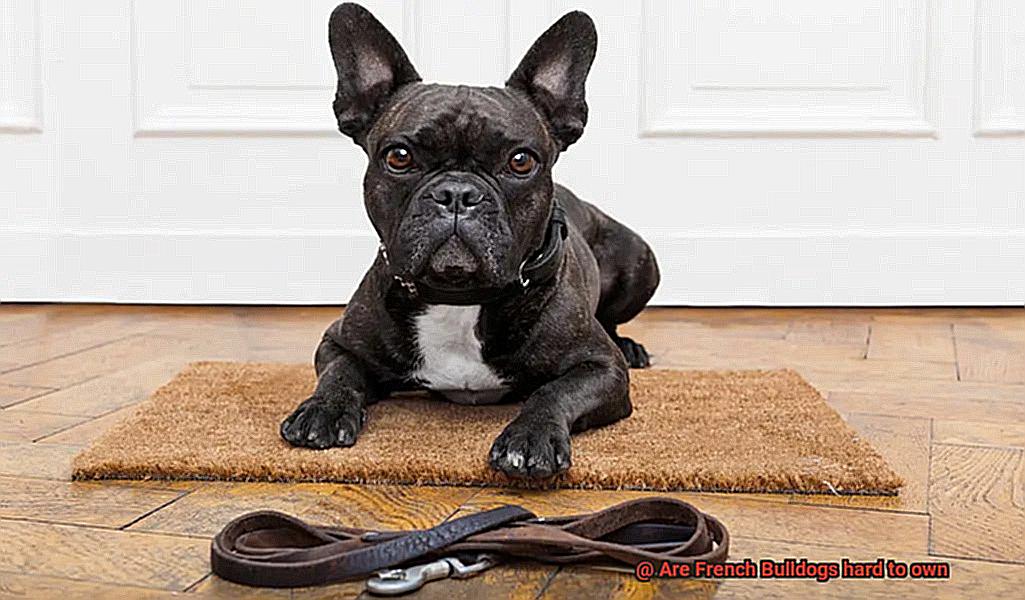Are French Bulldogs hard to own?
Curious about the challenges and rewards of owning a French Bulldog? These captivating canines, with their unmistakable bat-like ears and affectionate nature, have stolen the hearts of dog lovers worldwide. But are they hard to own? In this blog post, we’ll take a deep dive into the world of French Bulldogs – exploring their temperament, health concerns, exercise needs, and the immeasurable love they bring to their owners’ lives. So grab your favorite cup of tea, settle in, and join us on this exciting journey through the fascinating realm of these charming companions.
The Pros and Cons of Owning a French Bulldog
Contents
- 1 The Pros and Cons of Owning a French Bulldog
- 2 Health Issues Associated with French Bulldogs
- 3 Separation Anxiety in French Bulldogs
- 4 Grooming Requirements for French Bulldogs
- 5 Training Challenges with French Bulldogs
- 6 Are French Bulldogs Hard to Own?
- 7 How to Ensure a Happy Relationship with Your French Bulldog
- 8 What to Consider Before Bringing Home a French Bulldog
- 9 Conclusion
With their charming personalities and unique appearance, it’s no wonder why they have become such popular pets. However, before bringing a French Bulldog into your life, it’s important to weigh the pros and cons. In this post, we will explore the advantages and disadvantages of owning a French Bulldog, helping you make an informed decision about whether this breed is the right fit for you.
Pros of Owning a French Bulldog:
Affectionate Companionship:
French Bulldogs are known for their loving and loyal nature. They form deep bonds with their owners and thrive on human companionship. Whether you’re single or have a family, a Frenchie will provide endless snuggles and affection, making them the perfect cuddle buddies.
Low Exercise Requirements:
Unlike some high-energy breeds, French Bulldogs do not require hours of exercise each day. A short walk or playtime in the backyard is usually enough to keep them content. This makes them suitable for people with busy lifestyles or those living in apartments without access to large outdoor spaces.
Adaptability:

French Bulldogs are incredibly adaptable dogs. They can thrive in various living situations, including apartments or houses with small yards. Additionally, they tend to get along well with other pets, making them an excellent choice for families with existing furry members.
Good with Children:
French Bulldogs have a patient and gentle nature, making them great companions for children. They can tolerate the playful antics of little ones and are known for their patience around kids. However, supervision is always necessary to ensure safe interactions between dogs and children.
Easy Grooming:
With their short coats, French Bulldogs require minimal grooming compared to long-haired breeds. A quick brushing once or twice a week is usually sufficient to keep their coat healthy and free from excessive shedding. Additionally, they do not have a strong odor, which is a plus for those who prefer low-maintenance pets.
Cons of Owning a French Bulldog:
Health Issues:
One of the main concerns with French Bulldogs is their susceptibility to health problems. Their brachycephalic (short-nosed) structure makes them prone to respiratory issues, which can cause breathing difficulties, especially in hot weather. They are also prone to skin allergies, joint problems, and eye conditions. Regular veterinary check-ups and potential medical expenses should be considered.
Heat Sensitivity:
French Bulldogs have a low tolerance for heat. Their short snouts make it difficult for them to regulate their body temperature, putting them at risk of heatstroke. It’s crucial to keep them in cool and shaded environments during hot weather, provide access to fresh water at all times, and avoid strenuous activities during peak temperatures.
Health Issues Associated with French Bulldogs
French Bulldogs are beloved for their adorable appearance and affectionate nature. However, like any other dog breed, they are prone to certain health issues that potential owners should be aware of. In this article, we will discuss the common health problems associated with French Bulldogs and provide insights based on first-hand knowledge and expertise.

Brachycephalic Syndrome:
French Bulldogs have a distinctive flat face and short muzzle, which can lead to breathing difficulties known as Brachycephalic Syndrome. Symptoms include snoring, wheezing, and difficulty in exercising or staying active. It is important to prevent overheating and overexertion in French Bulldogs to avoid severe consequences.
Allergies:
French Bulldogs are prone to allergies, which can be triggered by various factors such as food, environmental elements, or certain materials. Allergies can cause skin irritations, itching, hair loss, and gastrointestinal problems. Identifying and avoiding triggers is crucial for managing allergies in French Bulldogs.
Genetic Conditions:
Hip dysplasia and patellar luxation are genetic conditions commonly seen in French Bulldogs. Hip dysplasia refers to improper development of the hip joint, leading to pain and discomfort. Patellar luxation occurs when the kneecap slips out of place, causing lameness. Regular veterinary check-ups and proper care can help manage these conditions.
Obesity:
French Bulldogs have a tendency to gain weight easily, making them prone to obesity-related health issues such as joint problems, heart disease, and diabetes. Providing a balanced diet and regular exercise is essential in preventing obesity in French Bulldogs.
Conclusion:
While French Bulldogs are generally considered a healthy breed, they do have specific health issues that owners should be aware of. By understanding the risks associated with Brachycephalic Syndrome, allergies, genetic conditions like hip dysplasia and patellar luxation, as well as the importance of preventing obesity, owners can ensure their French Bulldogs lead happy and healthy lives. Remember to consult with a veterinarian for personalized advice and guidance on your specific dog’s health needs.
Separation Anxiety in French Bulldogs
We all know that sinking feeling when we have to leave our furry friends alone. But for French Bulldog owners, separation anxiety can be a real challenge. These adorable pups are known for their affectionate nature and their strong attachment to their human family members. So, when they’re left alone, they can experience intense distress and anxiety.
In this blog post, we’ll explore the signs and symptoms of separation anxiety in French Bulldogs, as well as provide practical tips on how to help your Frenchie feel more at ease when you’re away.
Signs and Symptoms of Separation Anxiety

French Bulldogs with separation anxiety may exhibit a range of behaviors that indicate their distress. Here are some common signs to look out for:
- Excessive Vocalization: Does your Frenchie bark, howl, or whine incessantly when you’re not around? This could be a sign of separation anxiety.
- Destructive Behavior: Have you come home to find chewed-up furniture or shoes? French Bulldogs with separation anxiety may resort to destructive behavior as a way to cope with their anxiety.
- Pacing and Restlessness: If your Frenchie is constantly pacing or seems restless when left alone, it could be a sign that they’re feeling anxious and overwhelmed.
- Excessive Drooling: Does your Frenchie leave behind a trail of drool when you’re not home? Excessive drooling can be a sign of stress and anxiety.
- Accidents in the House: Even if your Frenchie is usually house-trained, they may have accidents in the house when experiencing separation anxiety.
Helping Your Frenchie Feel at Ease
Now that we’ve identified the signs of separation anxiety in French Bulldogs, let’s explore some practical strategies to help your Frenchie feel more comfortable when you’re away.
- Gradual Desensitization: Start by leaving your Frenchie alone for short periods, gradually increasing the duration over time. This process, known as counterconditioning, can help your Frenchie associate being alone with positive experiences.
- Mental and Physical Stimulation: Before leaving your Frenchie alone, engage in activities that provide mental and physical stimulation. Playtime, training sessions, or puzzle toys can help tire out your Frenchie and reduce their anxiety levels.
- Calming Aids: Consider using pheromone diffusers or anxiety wraps to create a soothing environment for your Frenchie. These products can help reduce anxiety and provide a sense of security.
- Establish a Routine: French Bulldogs thrive on routine, so try to establish a consistent schedule for feeding, exercise, and alone time. This predictability can help reduce anxiety as your Frenchie knows what to expect.


Grooming Requirements for French Bulldogs
French Bulldogs are undeniably charming little creatures with their cute bat-like ears and wrinkled faces. While they may not require extensive grooming like some other breeds, Frenchies still need regular care to keep them clean, healthy, and looking their best. In this blog post, we’ll dive into the grooming requirements for French Bulldogs, providing you with expert tips and insights to ensure your Frenchie stays fabulous.
Brushing:
French Bulldogs have a dense and fine coat that sheds moderately throughout the year. Regular brushing is essential to remove loose hairs and prevent them from covering your furniture and clothing. Use a soft bristle brush or a rubber grooming mitt to gently brush your Frenchie’s coat, distributing the natural oils and keeping it shiny.
Bathing:
French Bulldogs should be bathed once every 2-3 months or as needed. It’s crucial to use a mild dog shampoo specifically formulated for their sensitive skin. Avoid using human shampoos as they can be too harsh and dry out their skin. Remember to rinse your Frenchie thoroughly to remove all soap residue, as leftover soap can cause skin irritations.
Ears:
French Bulldogs’ adorable ears are prone to wax build-up and infections. Regular cleaning is necessary to prevent any issues. Use a damp cotton ball or a soft cloth to gently wipe the inside of their ears, being cautious not to insert anything into the ear canal. If you notice any signs of discomfort or excessive discharge, consult your veterinarian for proper treatment.
Nails:
Keeping your Frenchie’s nails trimmed is crucial for their comfort and overall well-being. Overgrown nails can cause pain and affect their ability to walk properly. Regularly trim their nails using a dog nail clipper or grinder, ensuring not to cut too close to the quick. If you’re unsure, seek advice from a professional groomer or your veterinarian.
Teeth:
Dental hygiene is often overlooked but plays a vital role in your Frenchie’s health. Regularly brushing their teeth with a dog-specific toothbrush and toothpaste helps prevent dental issues. Additionally, providing dental chews or toys designed to promote dental health can contribute to clean and strong teeth.
Wrinkles and folds:
French Bulldogs’ wrinkles and folds require special care to prevent skin infections. Keep these areas clean and dry by gently wiping them with a soft cloth or a baby wipe. Be sure to pay extra attention to the folds around their nose, mouth, and tail pocket.
Professional grooming:
While at-home grooming is essential, some owners choose to take their Frenchies to professional groomers for a more thorough cleaning and maintenance. Professional groomers have the expertise to handle their specific needs, offering services like nail trimming, ear cleaning, and expressing anal glands if necessary.
Training Challenges with French Bulldogs
French Bulldogs are known for their unique personalities and lovable nature, but they can also present some training challenges. Understanding these challenges and knowing how to overcome them is essential for successful training with this breed. Here are some of the common training challenges associated with French Bulldogs:
- Stubbornness and Independence: French Bulldogs have a reputation for being stubborn and independent, which can make training a bit more challenging. They may not always be motivated to follow commands or learn new behaviors, so patience and persistence are key.
- House Training Difficulties: French Bulldogs are not always the easiest breed to house train. Consistent and patient efforts are required to establish a routine and reinforce good bathroom habits. Crate training can be particularly helpful for house training French Bulldogs.
- Lack of Eagerness to Please: Unlike some other breeds, French Bulldogs are not highly motivated to please their owners. This can make obedience training more challenging, as they may not always respond to traditional training methods that rely on praise or rewards.
- Physical Limitations: Due to their brachycephalic (short-nosed) structure, French Bulldogs may have difficulty with certain types of physical activities. Swimming or running long distances can be challenging for them, so owners should consider alternative exercise options that are suitable for their breed.
- Sensitivity to Harsh Training Methods: French Bulldogs are generally sensitive dogs and can be easily discouraged by harsh or forceful training methods. Positive reinforcement techniques, such as rewards and praise, are often recommended for effective training sessions.
- Importance of Socialization: Socialization is crucial for French Bulldogs from an early age. Exposing them to different people, animals, and environments will help them become well-rounded and confident dogs. This can prevent behavioral issues such as fearfulness or aggression.
- Prey Drive Management: French Bulldogs have a strong prey drive, which means they may be inclined to chase or harass smaller animals. Extra training and supervision may be required when it comes to interacting with other pets or participating in off-leash activities.
- Consistency and Repetition: French Bulldogs respond well to routines and familiarity. Consistency and repetition are key when training them, as they thrive in structured environments where expectations are clear.
- Stubbornness and Selective Hearing: Some French Bulldogs may exhibit stubbornness or selective hearing, making it challenging to get their attention during training sessions. Patience and persistence are important when working with these dogs, and finding effective motivation can help keep them engaged.
- 10. Seeking Professional Help: It’s important for owners to be aware of the potential challenges associated with French Bulldogs and be prepared to invest time and effort into their training and socialization. If specific challenges arise, seeking professional help from a dog trainer or behaviorist can provide valuable guidance.

Are French Bulldogs Hard to Own?
French Bulldogs, or “Frenchies” as they are affectionately called, have gained popularity as companion dogs in recent years. With their adorable looks and friendly demeanor, it’s no wonder why so many people are drawn to this breed. But before you bring a Frenchie into your home, it’s important to consider the potential challenges that come with owning one.
Health Issues: A Bulldog’s Achilles Heel
One of the main concerns with French Bulldogs is their health. Due to their unique physical characteristics, such as their flat faces and compact bodies, they are more prone to respiratory problems, joint issues, and skin allergies. This means that potential owners need to be prepared for regular visits to the vet, possible surgeries, and ongoing care to ensure their Frenchie’s well-being. It’s also important to note that the average lifespan of a French Bulldog is around 10-12 years, which is shorter compared to some other breeds.
Exercise Requirements: A Balancing Act
While French Bulldogs are not overly active dogs, they still require regular exercise to maintain a healthy weight and prevent boredom. A daily walk or play session is usually sufficient, but owners should be prepared to provide some form of physical activity on a regular basis. It’s important to find a balance between meeting their exercise needs while also being mindful of their physical limitations.
Training Needs: Patience is Key
French Bulldogs are generally intelligent dogs, but they can have a stubborn streak at times. This means that training may require patience and consistency. Positive reinforcement methods work best with this breed, as they respond well to praise and rewards. It’s important to establish clear boundaries and rules from an early age to prevent any behavioral issues from developing.
Financial Considerations: Budgeting for Your Frenchie
Owning a French Bulldog can be relatively expensive due to their potential health issues and the cost of veterinary care. Routine check-ups, vaccinations, and preventive medications are a must to keep your Frenchie healthy. Additionally, they may require specialized diets or medications, which can add to the overall expenses of owning this breed. Potential owners should be prepared to budget for these costs and have a plan in place to provide the necessary care for their Frenchie.
How to Ensure a Happy Relationship with Your French Bulldog
Owning a French Bulldog can be a joyful experience, but it requires effort and understanding to build a strong bond and maintain a happy relationship. In this article, we will explore six key areas to focus on: building a strong bond, consistent training, regular exercise, health maintenance, a healthy diet, and socialization. By following these guidelines, you can create a harmonious and fulfilling relationship with your furry companion.
Building a Strong Bond:
French Bulldogs are affectionate creatures who thrive on love and attention. Spend quality time with your Frenchie by playing games they enjoy or simply cuddling on the couch. Engaging in activities that strengthen the emotional connection between you will help establish trust and loyalty.
Consistent Training:
Training your French Bulldog is essential for their well-being and your happiness. Begin training from an early age and use positive reinforcement techniques, such as treats and praise. Consistency is key. Teach them basic commands like sit, stay, and come to ensure good behavior and reinforce your bond.
Regular Exercise:
Despite their small size, French Bulldogs have plenty of energy to burn. Daily walks, interactive play sessions, and mental stimulation activities are crucial to keep them physically and mentally fit. Be mindful of their short-nosed nature and adjust the intensity of activities accordingly.
Health Maintenance:
Regular veterinary check-ups, vaccinations, and preventive care are vital to keep your Frenchie in optimal health. Pay close attention to their dental hygiene by brushing their teeth regularly and providing appropriate chew toys. Proper grooming, including facial fold cleaning and nail trims, ensures their overall well-being.
Healthy Diet:
Providing your French Bulldog with a balanced diet is essential for their overall health. Opt for high-quality dog food that meets their specific nutritional needs. Avoid overfeeding or giving table scraps, as French Bulldogs are prone to obesity. Consult your veterinarian for personalized dietary advice.
Socialization:
French Bulldogs are social beings who crave human companionship. Introduce them to various people, animals, and environments from an early age to foster proper socialization. Take them to dog-friendly places, enroll in puppy socialization classes, or arrange playdates with well-behaved dogs to enhance their social skills.
What to Consider Before Bringing Home a French Bulldog
Here’s What You Should Know.
Are you considering getting a French Bulldog as your new furry companion? Before you make that decision, there are a few important factors to consider. These adorable little dogs have specific needs and requirements that potential owners should be aware of. Let’s dive into what you should know before bringing home a French Bulldog.
Exercise is important for all dogs, including French Bulldogs. While they may not need intense exercise like some other breeds, they still require daily physical activity to stay happy and healthy. A short walk or play session in the backyard can do the trick, but be careful not to overdo it. Due to their short noses, French Bulldogs can have difficulty breathing, especially in hot weather or during strenuous activities.
Health issues are another thing to keep in mind. French Bulldogs are prone to respiratory problems, skin allergies, and joint issues. Regular vet visits and potential medical expenses should be factored into your budget. It’s important to be prepared for any health challenges that may arise with your French Bulldog.
Grooming is relatively easy with French Bulldogs, but they do shed moderately. Regular brushing can help minimize shedding and keep their coat in good condition. Don’t forget to clean their facial wrinkles regularly to prevent infections.

Temperature sensitivity is another consideration. Due to their short noses, French Bulldogs are more susceptible to heatstroke. Keep them in cool environments during hot weather and provide them with access to water or a cooling vest if needed.
Training and socialization are essential for French Bulldogs. While they are intelligent and eager to please, they can also be stubborn at times. Consistent positive reinforcement training methods should be used to establish boundaries and ensure good behavior. Early socialization with other dogs and different environments is also important.
Lastly, owning a French Bulldog can come with financial responsibilities. They can be expensive to purchase, and ongoing costs such as food, grooming, veterinary care, and potential medical expenses should be considered.
YmNTJKu_7uw” >
Conclusion
Owning a French Bulldog may seem like a dream come true, but it’s important to understand the challenges that come with it. While they are undeniably adorable and have a unique charm, French Bulldogs can be quite demanding in terms of care and attention.
One aspect that makes French Bulldogs challenging to own is their health issues. These lovable little dogs are prone to a range of medical conditions, including respiratory problems, skin allergies, and spinal disorders. This means frequent visits to the vet and potentially costly medical bills.
Another factor to consider is their exercise needs. Despite their small size, French Bulldogs require regular physical activity to maintain a healthy weight and prevent obesity. However, due to their brachycephalic (short-nosed) structure, they are not well-suited for intense exercise or prolonged outdoor activities in hot weather.
Additionally, French Bulldogs can be stubborn and strong-willed at times. Training them requires patience, consistency, and positive reinforcement techniques. They may also have difficulty with housebreaking, which can be frustrating for inexperienced owners.
Furthermore, these dogs thrive on human companionship and can suffer from separation anxiety if left alone for long periods. They crave attention and love being part of the family unit. If you have a busy lifestyle or travel frequently, owning a French Bulldog may not be ideal.
In conclusion, while French Bulldogs make wonderful companions with their affectionate nature and amusing personalities, they do come with certain challenges. Their health issues, exercise needs, training requirements, and need for constant human interaction should all be carefully considered before bringing one into your home. With proper care and dedication though, owning a French Bulldog can be incredibly rewarding – just be prepared for the commitment it entails.




